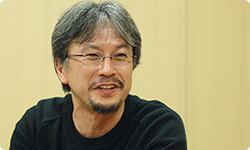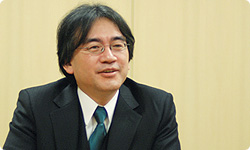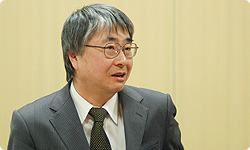4. Dealing with “Veteran” Gamers
While Zelda was progressing with Capcom, what were you doing, Aonuma-san?
Majora’s Mask had finished, and development of The Wind Waker 16 had begun. We were making a 3D Zelda game, and making a game for a handheld device with Capcom. The two were advancing in parallel. 16The Legend of Zelda: The Wind Waker: An action-adventure game released in Europe in May 2003 for the Nintendo GameCube.
Two Zelda games developed together with Capcom were released, right?
In 2001, Oracle of Seasons and Oracle of Ages were released, and in 2004, The Minish Cap 17 was released. I took over the development of The Minish Cap soon after I had become a producer. 17The Legend of Zelda: The Minish Cap: An action-adventure game released in Europe in November 2004 for the Game Boy Advance.
And as you were making The Minish Cap, you were preparing for Twilight Princess 18. 18The Legend of Zelda: Twilight Princess: An action-adventure game released in Europe in December 2006 for Wii and Nintendo GameCube.
That’s right. And as we were making Twilight Princess, we were making Phantom Hourglass 19 for the DS. 19The Legend of Zelda: Phantom Hourglass: An action-adventure game released in Europe in October 2007 as the first title in the Zelda series for the Nintendo DS.
And that led to Spirit Tracks.
Yes. Phantom Hourglass took three years to complete, and Spirit Tracks took two. In Zelda terms, that’s smooth sailing. (laughs)

Yeah, I guess it is. (laughs) Tezuka-san and Nakago-san, I heard that rather than participate directly in development of Spirit Tracks, you served as testers part of the way through.
We were advisors.
I was the eldest advisor.
(laughs)
We played it while it was still in development, and gave feedback. I played it all the way through, and it was good.
Nakago-san, don’t lie! On numerous occasions you stopped and said, “This is no good!” (laughs)
Well, yeah, but…
Um…let me tell you what happened. For Zelda games, special consideration is needed for people playing for the first time. I was a producer, so, like Miyamoto-san, I was keeping an eye on things and tightening everything up from the early stages of development. Then, halfway through, two elder advisors suddenly joined. But, since they were just testers, they quickly got beyond what I had worked on.
Of course they would find problems in the places you hadn’t polished up yet. (laughs)
They raked me over the coals about places I hadn’t even seen yet, saying, “It’s good up to here, but after that it’s awful.” Then I raced to catch up.
I know just how harsh the language can be when two of the Manzai Trio start criticising.
You can’t pass it onto the rest of the staff, right?
Sharp words like “This is no good” aren’t so bad by comparison. As they gradually get tired, they’ll just sigh without saying anything! (laughs)
I heard someone use the expression “veteran” gamers.
Yeah. I said that. When I passed on their feedback to the staff, we’d entered the final leg of development and no one had a moment to spare, but I had to tell them what to fix. I said, “Expanding the target user demographic is important, so even “veteran” gamers have got to be able to play it!”
Ha ha ha! (laughs)
And as we talked about last time, the way to solve the puzzles this time is different.
There are science puzzles, is that right?

Yes. So if our two elderly gamers were saying “I don’t get it” more than we expected, than it would probably be difficult even for people who have been playing Zelda all along. So in the end we adjusted that somewhat.
It was alright. At least Miyamoto-san didn’t up-end any tea tables this time.
To tell you the truth, I was worried about that, because he was tied up with New Super Mario Bros. Wii for so long that it looked like he didn’t have a chance to see the new Zelda for quite a while. Some of us were worried that you wouldn’t make the release date. But when I asked Miyamoto-san about it, he said it looked fine, so I was enormously relieved.
But there was that one time when the two elderly gamers went over by Miyamoto-san and the three of them started whispering. It looked to me like a counter-campaign was beginning.
(laughs)
I thought, “Uh-oh…” and raced over and asked what was up. They were talking about how to solve a puzzle Nakago-san couldn’t solve. I said, “Nakago-san, I bet you didn’t see the so-and-so in that one place,” and Miyamoto-san said, “That may be in the game, but if Nakago-san didn’t see it, then other players might not see it either, which is the same as if it weren’t in there at all.”
When you’re creating the game world, it’s easy to assume that players will behave in a certain way.
Yeah. You shouldn’t rest easy just because you’ve prepared something within the game.
You’ve got to think about all kinds of players. For people who can’t grab the mushroom, you’ve got to put in a pipe so it comes back*. * See Iwata Asks: New Super Mario Bros. Wii for more on how Super Mario Bros. was designed so that everyone is sure to get the first mushroom.
I think so.
The impression the final game makes is incredibly good, though. You can really feel the enthusiasm of the developers when you’re playing, and how it treats the core elements of Zelda with respect, carrying on what is good about previous games, while adding various new elements on the side.
That’s right. When you’re playing it, it’s like it has kept what was good about the previous game, Phantom Hourglass. It hasn’t simply thrown out the old material.

That’s right. You mess up if you put in lots of effort to do better than before, but throw out some good things because they’re old and just indiscriminately add new things. Just because something is new, you can’t guarantee it’s good.
That’s just like with New Super Mario Bros. Wii.
Yeah. That’s what usually happens, but this time was completely different. When development ended and I was talking to the staff, they all said development was really fun this time.
Similar to Link’s Awakening.
Yes, that’s right.
In my experience, when the developers say that development was fun, the final product is good.
That’s why I think development must have been fun this time. We created a satisfying game, and when I played it, I was happy.
Even dealing with “veteran” gamers. (laughs)
I’m getting ”veteran” myself. I’ll be joining them before too long. (laughs)
(laughs)